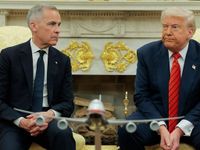In a significant diplomatic meeting on May 6, 2025, Canadian Prime Minister Mark Carney met with U.S. President Donald Trump at the White House, where he firmly stated, "Canada is not for sale." This declaration came in response to Trump's repeated assertions about wanting to annex Canada and make it the 51st state. While the two leaders discussed various topics, including trade, tariffs, and defense, Carney's remarks underscored Canada's commitment to its sovereignty amidst ongoing tensions with the U.S.
Carney, fresh off his victory in the federal election at the end of April, approached the meeting with a clear agenda: to address the tariffs imposed by Trump and to initiate serious discussions on trade relations. Despite the gravity of the issues at hand, the atmosphere during the meeting remained cordial, with both leaders projecting a friendly demeanor.
During the press conference that followed their discussions, Carney reiterated his position, saying, "Some places are never for sale, ever." In a light-hearted exchange, Trump responded, "Never say never, never say never," but he ultimately dismissed Carney's request to lift tariffs on Canadian goods, stating that Canada had nothing the U.S. wanted.
Trump's rejection of the tariff lift came as no surprise, considering his administration's stance on trade. He described the current North America trade agreement, known as the Canada-U.S.-Mexico Agreement (CUSMA), as a "transitional deal" and hinted that it could be scrapped entirely in the future. However, he also acknowledged its effectiveness, saying, "CUSMA is great for all countries; it’s good for all countries," marking a rare moment of praise for the agreement.
Carney, while optimistic about the discussions, emphasized the need for changes to the CUSMA deal, stating, "Some things about it are going to have to change." He pointed out that the way Trump has conducted tariffs has taken advantage of existing aspects of the agreement, which has led to complications for Canadian businesses.
In a notable moment, Carney highlighted that Canadian cars contain about 50% American content, underscoring the interconnectedness of the two economies. This fact was crucial as Carney argued that Canadian steel, aluminum, and auto parts significantly enhance the competitiveness of American auto companies.
Despite the positive tone, underlying tensions remained palpable. Trump reiterated his desire to see Canada become the 51st state, a notion Carney firmly opposed. "I would go back to showing the difference between a wish and a reality," Carney said, emphasizing that this is not a possibility for Canadians.
Political analysts and business leaders viewed the meeting as a potential reset in U.S.-Canada relations. Ontario Premier Doug Ford remarked that Carney appeared to have "held his own" against Trump, while Alberta Premier Danielle Smith expressed hope that this meeting could mark a turning point in relations with the U.S.
Carney's administration is also focusing on the looming review of CUSMA, scheduled for July 1, 2026. This review could provide an opportunity for Canada to renegotiate aspects of the agreement that are not working in its favor. Business leaders have urged both countries to move forward with negotiations to address the uncertainty created by tariffs, which have already led to job losses in Canada.
For instance, Unifor, a major Canadian labor union, recently announced that Stellantis N.V. would be reducing production at its Windsor assembly plant, and General Motors laid off 750 workers at its Oshawa plant due to the impact of U.S. tariffs.
In the wake of the meeting, there is cautious optimism among business leaders that a new framework for trade discussions could emerge. Goldy Hyder, president of the Business Council of Canada, stated, "I think the president has opened a wide-open door, and we need to drive through it." This sentiment reflects a broader hope that CUSMA could serve as a foundation for resolving ongoing trade disputes.
As the discussions progress, both leaders have agreed to continue conversations in the coming weeks, with plans to meet again at the G7 Summit in Kananaskis, Alberta. The G7 meeting could serve as a pivotal moment for both nations as they seek to redefine their economic relationship.
While CUSMA is not technically up for renegotiation until 2026, many believe that there is no need to wait. Hyder suggested that Carney should propose a meeting of North American leaders on the sidelines of the G7 to jumpstart discussions. "Call them to the G7, have a sidebar North American leaders summit, put on the agenda: where do we go from here?" he urged.
The next steps for Canada and the U.S. will be critical as they navigate the complexities of trade relations amid a backdrop of tariffs and political aspirations. Carney's firm stance on Canadian sovereignty and the necessity for a balanced trade agreement could set the tone for future negotiations.
In conclusion, the meeting between Prime Minister Carney and President Trump marks the beginning of a new chapter in U.S.-Canada relations. With tariffs and trade agreements at the forefront of discussions, both leaders will need to find common ground to foster a mutually beneficial economic partnership.




